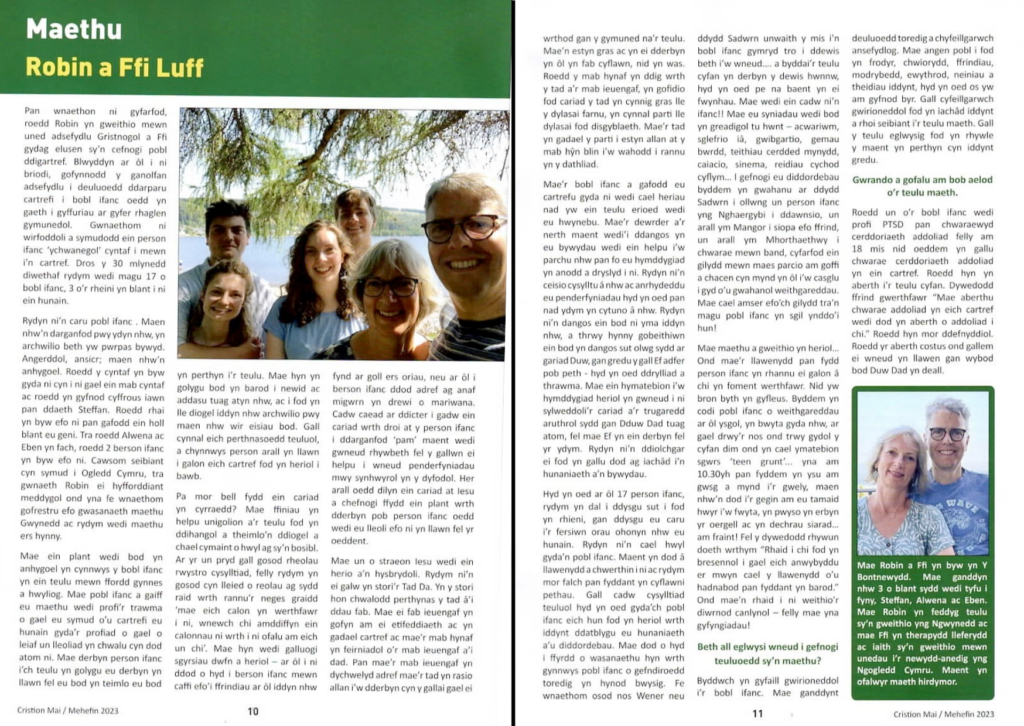
Robin and Ffi live in Bontnewydd. They have 3 older children, Steffan, Alwena and Eben. Robin is a GP working in Gwynedd and Ffi is a Speech and Language Therapist and works in neo-natal units in North Wales. They are long term foster carers.
When they met, Robin worked in a Christian rehabilitation unit and Ffi with a charity that supports homeless people. A year after they got married, the rehabilitation centre asked the families to provide homes for teenagers that were addicted to drugs for a community programme. Robin and Ffi volunteered, and their first ‘extra’ young person moved in. Over the last 30 years they have raised 17 teenagers, 3 of those being their own.
“We love teenagers. They discover who they are, examining what is the purpose of life. Passionate, unsure; they are amazing. Our first teenager lived with us before we had our first son, and he was very excited when Steffan arrived. Teenagers lived with us throughout the births of all our children. Whilst Alwena and Eben were younger, two young people lived with us. We had a break before moving to North Wales, whilst Robin did his medical training but then we registered with Gwynedd Fostering Service and have fostered ever since.
Our children have been amazing including the young people in our family in a warm and fun way. The foster teenagers have experienced the trauma of being moved from their own home and the trauma of having at least one failed placement before coming to us. Accepting a teenager into your family means accepting them fully so that they feel a part of the family. This means being ready to change and adapt for them, and to be a safe place for them to examine who they really want to be. Maintaining your family relations and including another person fully into the heart of your home can be a sacrifice for everyone.
How far will our love reach?
Boundaries can help individuals and the family be and feel safe and have the most fun possible. At the same time, setting rules could prevent a connection, therefore we set as few rules as possible whilst sharing the core message ‘your heart is precious to us, will you protect our hearts whilst we protect yours’. This has enabled deep and challenging conversations- after we found a young person in a café with their friends after being lost for hours, or after a young person came home with an ankle injury and smelling of marijuana.
Keeping a lid on anger to keep our love has meant turning to the young person to find out ‘why’ they have done something to help them make more sensible decisions in the future. Another challenge was to follow our love of Jesus and support our children’s faith while fully accepting each teenager placed with us as they were.
One of Jesus’s stories has challenged and inspired us. We call it the Story of the Good Father. In this story the father’s relationship with his two sons broke down. His youngest son asks for his inheritance and leaves home, and the eldest son is critical of the youngest son and his father. When the youngest son returns home the father races out to accept him before the community or family can reject him. He extends grace and acceptance, and restores him to full sonship, not servitude. The eldest son was angry with the father and the youngest son, he was worried that the father’s love offered grace where he should have judged, held a party where there should have been discipline. The father leaves the party to reach out to the angry older son to invite him to share in the celebration.
The young people housed with us have had challenges that our family have never faced and the courage and resilience they have shown in their lives has helped us respect them when their behaviour was difficult and confusing for us. We try to reach out to them and honour their decisions even when we don’t agree with them. We show that we are there for them, and through that we hope we can show what God’s love looks like, believing that He can restore everything – even wreckage and trauma. Our responses to their challenging behaviours make us realise the immense love and mercy God the Father has towards us, as He accepts us as we are. We are grateful that He can bring healing to our identity and our lives.
It has kept us young!
Even after 17 teenagers, we are still learning how to be parents, learning to love them to the best version of themselves. We have fun with our young people. They bring us joy and laughter and we are so proud when they achieve things. Maintaining family cohesion even with your own teenagers can be challenging as they develop their identities and interests. Finding ways to serve this while including teenagers from broken backgrounds is extremely important. We set a Friday night or Saturday once a month for our young people to take a turn choosing what to do…and the whole family would follow that choice, even if they do not enjoy it. It has kept us young! Their ideas have been endlessly creative – aquarium, ice skating, go karting, board games, mountain walks, kayaking, cinema, rib rides. To support their interests, we would part ways on Saturday to drop off one young person to Holyhead to dance, another to Bangor to shop with a friend, another to Menai Bridge for a band, meeting each other in a car park for coffee and cake before going back to collect all of them from their various activities. Having time with each other while raising teenagers is a skill in itself!
Fostering and Working
Fostering and working is challenging…but the joy when a young person shares their heart with you is a precious moment. It is almost never convenient. We would take young people to after school activities, eat with them, be available all night but throughout it all we would only get ‘teen grunt’ conversation responses…then at 10:30pm when we’re desperate for sleep and go to bed, they turn up in the kitchen for their late snack, lean against the fridge and start talking…what a privilege! As someone wise told us ‘You must be present to be ignored in order to have the joy of knowing them when they are ready’…but we must work the next day – so there are restrictions!
What can Churches do to support families who foster?
Be a real friend to the young people. They have dysfunctional families and unstable friendships. People need to be their brothers, sisters, friends, aunties, uncles, grandparents, for life, even if it is for a short time. True friendship can be healing for them and give the foster family a break. The Church family can be somewhere they belong before they believe.
Listen and care for each member of the foster family. One of our foster teenagers experienced PTSD when worship music was played so for 18 months, we were unable to play worship music in our home. This was a sacrifice for the whole family. A precious friend said, ‘The sacrifice of not playing worship music in your home has become a sacrifice of worship for you’. This was so helpful. The sacrifice was costly, but we could do it joyfully knowing that God the Father understands.”
With the thanks to ‘Cristion‘, a Welsh Christian magazine for sharing this article from our foster carers Robin and Ffi who discuss why they foster teenagers and how they combine working and fostering, with support from their Church family.

Could you foster with your local authority?
If you live in Gwynedd, contact Maethu Cymru Gwynedd and a member of our dedicated team will be in touch for a friendly, no obligation conversation to help you decide if fostering is right for you.
If you live anywhere else in Wales, visit Maethu Cymru / Foster Wales for more information and to find your local authority fostering team.

